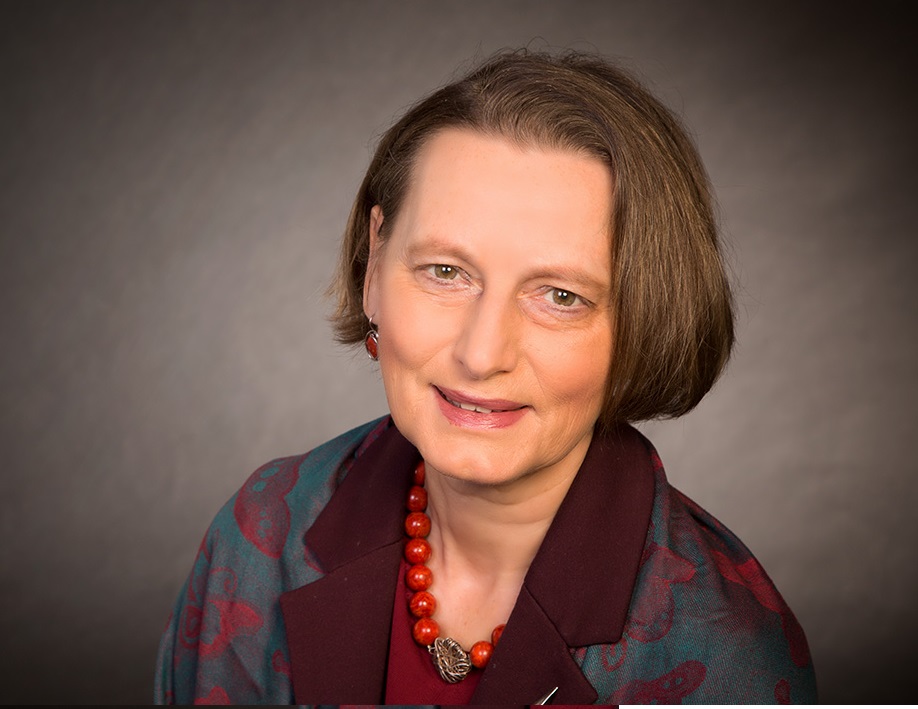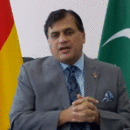
Katja Knoche
E-Mail:
knoche@hdw.uni-siegen.de
Tel.: +49 (0)271 / 740 - 2513
Villa Sauer
Obergraben 23
57072 Siegen
Raum: 001
Karin Gipperich
E-Mail:
karin.gipperich@uni-siegen.de
Tel.: +49 (0)271 /740 - 2689
Villa Sauer
Obergraben 23
57072 Siegen
Raum: 003
Pakistan – Land mit vielen Facetten
Botschafter Dr. Mohammad Faisal briefte das Siegener MUN-Team für die Teilnahme an der digitalen Konferenz in New York
Die Teams von Model United Nations der Universitäten Siegen und Gent nehmen gemeinsam Anfang April 2021 an der digitalen Konferenz der Vereinten Nationen in New York teil und vertreten die Islamische Republik Pakistan. Im Rahmen der Vorbereitung erarbeiteten die Studierenden Positionspapiere für ihre jeweiligen Komitees. Den Delegierten der Universität Siegen wurde eine besondere Ehre zuteil. Der Botschafter Pakistans in Berlin, seine Exzellenz Dr. Mohammad Faisal, nahm sich nicht nur die Zeit, die Papiere zu lesen, sondern auch eine Stunde, um den jungen Diplomaten via ZOOM die Politik seines Landes zu erörtern und die Fragen der Studierenden zu beantworten.
Begrüßt wurde der Gast von Prorektorin Prof.in Dr. Petra Vogel (Internationales und Lebenslanges Lernen) und MUN-Koordinator Gerrit Pursch. Die Prorektorin berichtete in ihrem Grußwort über eigene Reisen nach Pakistan, „in ein eindrucksvolles Land mit den höflichsten Menschen, die ich jemals getroffen habe“.
Faisal, Jahrgang 1971, ist seit 1995 auf internationalem Parkett zu Hause. Er vertrat sein Land nicht zuletzt bei den Vereinten Nationen und in Brüssel. Im vergangenen Jahr trat er seinen Dienst als Botschafter seines Landes in Berlin an. Seine Ausführungen begann er mit dem Lob der Arbeit der Studierenden. In den erarbeiteten Papieren seien keine Differenzen zur Politik seines Landes zu finden. Mit Blick auf die weltweite Covid-Pandemie führte er aus, dass sein Land mit etwa 500.000 Infizierten und 11.000 Toten im Vergleich recht gut dastehe und einen Smart-Lockdown fahre mit regionalen Maßnahmen, so notwendig. Deutschland könne es sich ökonomisch erlauben, weite Bereiche in Wirtschaft und Gesellschaft herunterzufahren, in Pakistan verlören dann etwa 80 Prozent der Bevölkerung ihre Lebensgrundlage. Faisal: „Covid hat das Leben verändert. Ohne wäre ich eventuell an Ihre Universität gekommen.“
Den Nachhaltigkeitszielen der UN, so der Botschafter, sei Premierminister Imran Khan sehr zugewandt. Die Folgen des Klimawandels habe Pakistan bei der Überschwemmungskatastrophe 2010 erfahren und um internationale Hilfe gebeten. Elektronische Autos - so ein Blick in die technologische Zukunft - werde es in seinem Land 2030 nicht flächendeckend geben, eher 2050. Auch regenerative Energien seien für sein Land sehr interessant: „Wir wollen uns in diesem Bereich entwickeln“. Kooperationen mit deutschen Firmen würden angestrebt.
Auf die Flüchtlingsfrage angesprochen, verwies Faisal auf das Jahr 1979 und die sowjetische Invasion in Afghanistan. Viele Afghanen seien nach Pakistan geflüchtet und lebten heute dort zum Teil in der dritten Generation. Pakistan beherberge rund 3 Millionen Flüchtlinge und somit die größte Anzahl weltweit. Diese genössen in seinem Land weitgehende Rechte, wenn es sich aktuell auch überwiegend um Wirtschaftsflüchtlinge handele. Denn die Intervention westlicher Staaten habe zu einer Stabilisierung der Situation in Afghanistan geführt.
Hinsichtlich der Geschlechtergleichstellung gebe es viel Unkenntnis über Pakistan, bedauerte der Botschafter. Immerhin habe sein Land bereits 1990 eine Premierministerin gehabt. Er räumte aber ein, dass es in seinem Land Probleme mit Armut, Bildungsmangel und Terrorismus gebe: „In den Grenzbereichen gibt es noch viele Herausforderungen.“ Die Auseinandersetzung mit Indien binde Ressourcen, die anderweitig auch benötigt würden. Sein Land jedoch müsse die Sicherheit der eigenen Bürger sicherstellen.
Pakistan, so Faisal, verfüge über fruchtbares Land. Es gebe ausreichend Nahrungsmittel, aber auch Missmanagement. Dem MUN-Team wünschte der Botschafter zum Abschluss von Briefing und Diskussionsrunde viel Erfolg auf dem simulierten diplomatischen Parkett.
Kontakt: Gerrit Pursch, M.A. Tel.: 0271 740-3028;E-Mail: gerrit.pursch@uni-siegen.de
English version below
Pakistan A Multifaceted Land
Ambassador Dr Mohammad Faisal briefed the Siegen MUN delegation for their upcoming participation at the online NMUN conference in New York.
The Model United Nations (MUN) delegations from Siegen and Ghent are jointly representing the Islamic Republic of Pakistan at a United Nations simulation based in New York. The conference will take place in early April, 2021 and be held entirely online. As part of their preparations, the students prepared position papers for their respective committees. The Siegen delegation had the honour of meeting with His Excellency Dr Mohammad Faisal. Dr Faisal, who is the current ambassador of Pakistan to Germany, not only took the time to read through the delegate’s position papers, but he was also kind enough to take an hour of his time to discuss his country’s policies with them over Zoom, as well as to answer questions.
The guest was welcomed by Prorector of the University of Siegen Prof Dr Petra Vogel (International Affairs and Lifelong Learning) and MUN Coordinator Gerrit Pursch. In her welcome address, the Prorector reflected on her own travels to Pakistan, describing Pakistan as “an impressive country with the most polite people I have ever met". Faisal, born in 1971, has been active on the international stage since 1995, having represented his country in many forums, not least at the United Nations and in Brussels. Last year, he took up the post as his country's ambassador to Germany.
He began his remarks at the online meeting by praising the work of the students. He remarked that no differences with his country's policy could be found in the papers they had produced. With regard to the worldwide COVID-19 pandemic, he explained that his country was doing quite well in comparison to many others, with about 500,000 infected and 11,000 dead. These relatively low figures were attributed to smart lockdowns combined with regional measures. He further noted that, while Germany could economically afford to shut down large sectors of the economy and society, in Pakistan, this would result in about 80 percent of the population losing their livelihoods. Faisal: "Covid has changed lives. Without it, I may have already visited your university."
The ambassador emphasised the Pakistani Prime Minister Imran Khan’s firm commitment to the UN's Sustainable Development Goals. Pakistan experienced the consequences of climate change first-hand during the disastrous 2010 floods for which international aid was required. When asked about electric cars, widely seen to be the future of automobile technology, Dr Faisal explained that they are not expected to be widely available in Pakistan until 2050. On the other hand, renewable energy is a high priority for Pakistan, and cooperation with German companies is being sought to facilitate development in this area.
When asked about refugees in Pakistan, Dr Faisal explained that Pakistan first received large numbers of refugees after the Soviet invasion of Afghanistan in 1979. Since that time, many of them have had families in Pakistan. Pakistan is currently home to around 3 million refugees, the largest number in the world. These refugees enjoy extensive rights in the country, even if many of them are primarily economic refugees. Dr Faisal observed that the intervention of Western countries has led to a stabilisation of the situation in Afghanistan.
With regard to gender equality, the ambassador stated that there is regrettably a lot of ignorance about Pakistan. Pakistan already had its first female prime minister in 1990. He admitted, however, that there were problems with poverty, a lack of education and terrorism in Pakistan: "There are still many challenges in the border areas." Pakistan’s difficult relationship with India results in a loss of resources that could be more useful elsewhere. However, he said, his country must work to ensure the security of its people.
Pakistan, Faisal said, has fertile land and sufficient water to provide for its people, however there are issues with mismanagement of these resources. At the conclusion of the briefing and discussion with the students, Dr Faisal wished the MUN delegation the best of luck with their own activities on the diplomatic stage at the upcoming UN simulation.
Contact: Gerrit Pursch, M.A. Phone: (+49) 271 740-3028; E-mail: gerrit.pursch@uni-siegen.de



